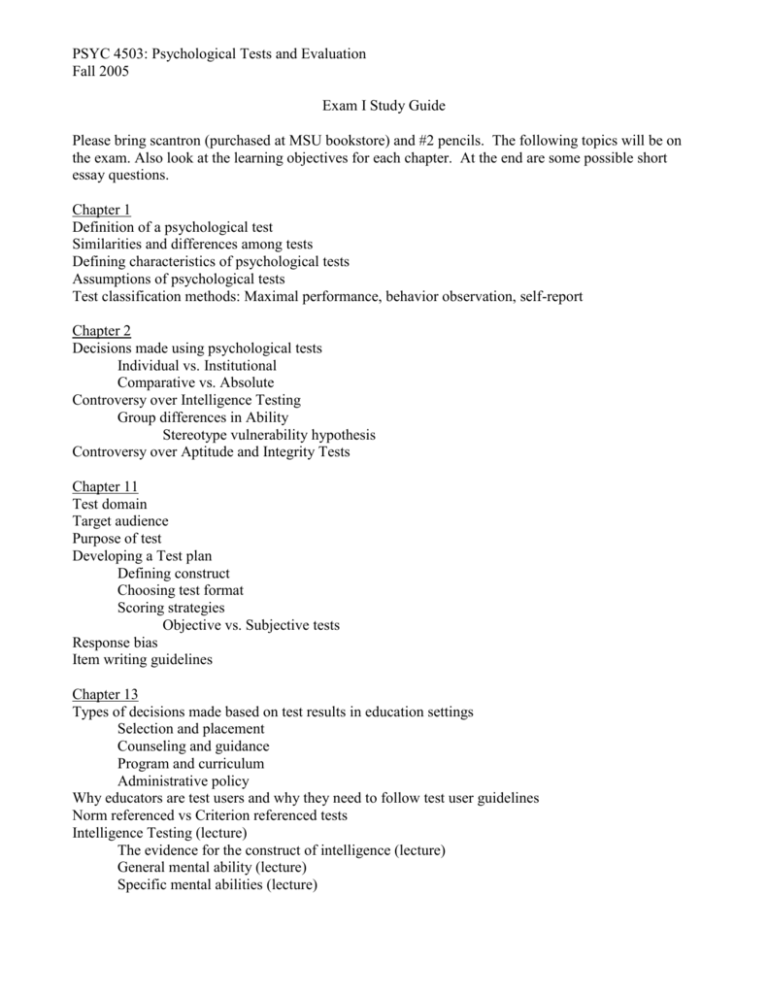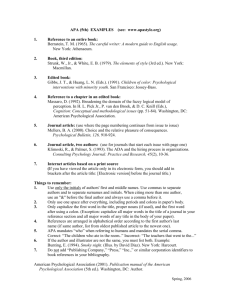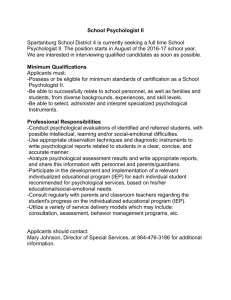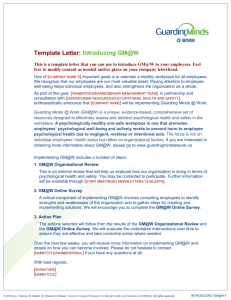Exam I Study Guide
advertisement

PSYC 4503: Psychological Tests and Evaluation Fall 2005 Exam I Study Guide Please bring scantron (purchased at MSU bookstore) and #2 pencils. The following topics will be on the exam. Also look at the learning objectives for each chapter. At the end are some possible short essay questions. Chapter 1 Definition of a psychological test Similarities and differences among tests Defining characteristics of psychological tests Assumptions of psychological tests Test classification methods: Maximal performance, behavior observation, self-report Chapter 2 Decisions made using psychological tests Individual vs. Institutional Comparative vs. Absolute Controversy over Intelligence Testing Group differences in Ability Stereotype vulnerability hypothesis Controversy over Aptitude and Integrity Tests Chapter 11 Test domain Target audience Purpose of test Developing a Test plan Defining construct Choosing test format Scoring strategies Objective vs. Subjective tests Response bias Item writing guidelines Chapter 13 Types of decisions made based on test results in education settings Selection and placement Counseling and guidance Program and curriculum Administrative policy Why educators are test users and why they need to follow test user guidelines Norm referenced vs Criterion referenced tests Intelligence Testing (lecture) The evidence for the construct of intelligence (lecture) General mental ability (lecture) Specific mental abilities (lecture) PSYC 4503: Psychological Tests and Evaluation Fall 2005 Factor analytic theories of intelligence (lecture) Intelligence Quotient score (Ratio IQ scores) vs. Deviation Scores (lecture) PSYC 4503: Psychological Tests and Evaluation Fall 2005 Chapter 14 Models of psychological assessment Clinical diagnosis Clinical interview Structured personality tests Projective techniques Nature of personality (lecture) Trait-oriented view Situational view Pervin (1980) definition Consistency in behavior (lecture) Relative vs. absolute consistency Consensus viewpoint Personality taxonomies: Example “Big 5” Extroversion Emotional stability Agreeableness Conscientiousness Openness to experience Objective Measures of Personality (lecture) Deductive vs. - Logical Content - Theoretical Empirical - Criterion groups/criterion-keying - Factor analytic Logical Content: Woodworth Personal Data Sheet (Clarification: Woodworth first developed using logical content method, but later revised using criterion groups method, which set stage for development of MMPI) How were items chosen originally? Drawbacks Criterion Groups Approach MMPI (text pp. 397-401) Original scale development Validity scales Clinical scales Revision and MMPI-2 Interpretation of Clinical scales: How differs from original purpose of MMPI Factor Analytic Strategy 16PF: Test construction Problems with factor analytic strategy Theoretical Strategy Edwards Personal Preference Schedule Ipsative scoring Response style & bias Combined Strategy NEO-PI Purpose and construction PSYC 4503: Psychological Tests and Evaluation Fall 2005 Sample short essay questions 1. What are some defining criteria of a psychological test? 2. What is meant by standardization? 3. What are the differences between Objective vs. Subjective scoring? Give an example of an objectively scored test and a subjectively scored test. 4. List and describe the 3 classifications of tests and provide an example of each. 5. Discuss 3 assumptions we must make when using psychological tests. Why are these assumptions important? 6. What are some of society’s concerns about the use of intelligence, aptitude, and integrity tests? 7. Why is psychological testing important? 8. What are the first four steps of developing a test? What activities are involved in each step? 9. Why is it important to conduct a literature review as an early step in test development? 10. When generating an item pool, what does it mean to be “over-inclusive”? Why be overinclusive? 11. What are some basic principles of item writing? 12. What are the benefits and drawbacks of using an objective or subjective test format? 13. Describe the types of decisions educators make based on the results of psychological tests. Give an example of each. 14. What are the similarities and differences between norm-referenced and criterion referenced tests? Provide an example of each. 15. What evidence is there for the concept of intelligence? 16. What is meant by the term “general mental ability”? How is this concept different from “specific mental abilities”? Give examples of specific mental abilities. 17. What is meant by the term “deviation IQ score”? What are the advantages of the deviation IQ score compared to the intelligence quotient score? 18. What are the similarities and differences among the three models of assessment? Include who is likely to use each. 19. What is the theory behind projective testing? How does it work? Give an example of a projective test. 20. According to the lecture, what are the different strategies for construction of an objective inventory of personality? Compare and contrast the different strategies. In other words, how are the methods different? What are the relative strengths and weaknesses of the different approaches? 21. Pick one of the test construction methods discussed in class and describe that method of test construction. How do you construct a test using this method? 22. What is the purpose of the MMPI validity scales? In general what type of information is obtained from these scales? 23. Describe the reason for the revision of the MMPI? What changes were made with the creation of the MMPI-2?





